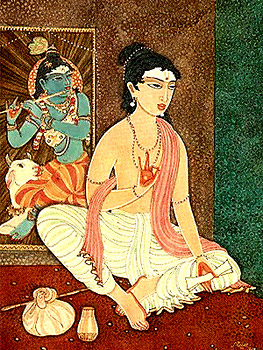 Kshetrajana is known to have composed more than 4000 compositions. He composed songs on his beloved deity Lord Krishna in Telugu. He was born in Movva village in Andhra Pradesh. Initially his parents named him Varadayya. As he loved travelling singing songs at various temples, he was known by the name Kshetragna or Kshetrayya (one who travels). His life has been depicted in the novel "Bliss Of Life" by Prof M. V Rama Sarma, Professor of English & former Vice chancellor, S.V University, Tirupati, Andhra Pradesh, India. It has been translated into Telugu with the title "Kshetrayya".
Kshetrajana is known to have composed more than 4000 compositions. He composed songs on his beloved deity Lord Krishna in Telugu. He was born in Movva village in Andhra Pradesh. Initially his parents named him Varadayya. As he loved travelling singing songs at various temples, he was known by the name Kshetragna or Kshetrayya (one who travels). His life has been depicted in the novel "Bliss Of Life" by Prof M. V Rama Sarma, Professor of English & former Vice chancellor, S.V University, Tirupati, Andhra Pradesh, India. It has been translated into Telugu with the title "Kshetrayya".
He idealized the padam format that is being used today. They are sung in dance (Bharatanatyam and Kuchipudi) and music recitals. The anupallavi is sung first then then the pallavi is sung or second verse followed by the first verse. A common theme of most of the padams is the longing for the coming of the lord Krishna.
He wrote with Sringara as a main topic in expressing devotion to the supreme. Sringara is a pattern where the ordinary sexual relationship between a woman and a man is used as a metaphor thereby indicating the yearning of jeeva to unite with the divine. He has used "Muvva Gopala" as his signature in most of his compositions. This is also a name for the Lord Krishna in Kshetrayya`s village Muvva now known as Movva.
His work has played a major role in influencing poetry, dance and music of the South Indian tradition. He was connected with the devadasis of the temples of south India who were also the subject of many of his compositions. His compositions form an integral part of the dance and musical traditions of South India, where his songs are considered as musical works or as an accompaniment to dance.
He was the contemporary of Venkatamakhi. He composed in several rare Ragas, which was perfect for the emotions that wanted to express in the particular Padam. His other themes include pangs of separation, jealousy, betrayal through the Nayaka-Nayaki approach of Jayadeva.
Some of his popular compositions are Ramarama (Bhairavi), Gaddari (Kalyani), Yemandu namma (Kedaragowla), Kontegadu (Surati) and so on.




